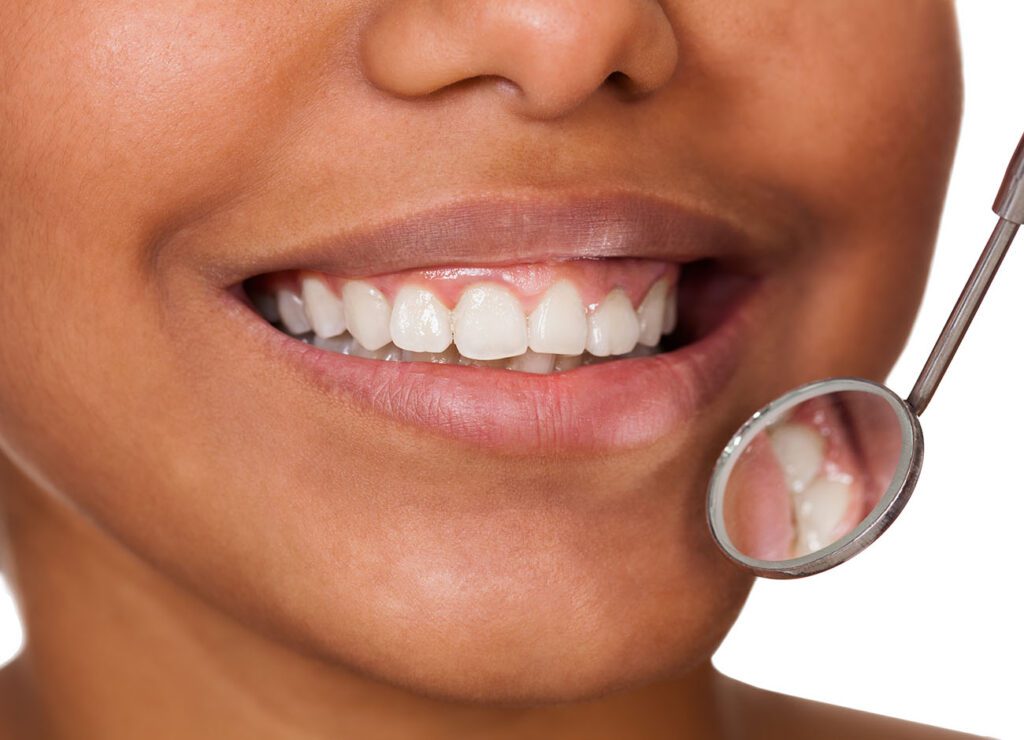Healthy gums are the foundation for a healthy mouth. Our dental care team spends considerable time with patients, educating them on gum health and how it impacts their overall health. Periodontal therapy is a restorative dentistry service in our Philadelphia, PA, office. This treatment can address the signs and symptoms of gum disease and help preserve tooth structure.
Gum disease is one of the most common diseases among Americans and affects as many as three out of every four adults. Not only is it bad for oral health, sometimes leading to tooth loss, but it is also bad for overall health. Many studies have established a link between gum disease and chronic diseases like diabetes, stroke, and heart disease. Gum disease also increases risks for pregnant women like a premature birth and low birth weight.
Dr. Conover offers a strong periodontal health program that includes prevention, diagnosis, and treatment of gum disease. As a cosmetic dentist, Dr. Conover can also address cosmetic gum concerns. He treats common cosmetic concerns, such as a gummy smile, which causes teeth to look short or asymmetrical.

Causes & Symptoms of Gum Disease
One of the leading causes of gum disease is plaque build-up. Plaque is a sticky film made of bacteria that forms in the mouth. It can build around the gum line and between teeth.
Over time, plaque hardens and turns into tartar. Tartar can irritate the gums and lead to an infection, and bacterial buildup can damage the gum tissue and the underlying bone. The only way to remove plaque and tartar from hard-to-reach places is with regular dental cleanings at our Philadelphia dentist’s office.
There are many contributing factors to gum disease. Patients with chronic conditions such as heart disease, diabetes, and pregnancy are more vulnerable to gum disease. Inflammation and changes in hormones can increase gum sensitivity. Other contributing factors may include teeth grinding, tobacco use, and poor nutrition.
Common signs of gum disease to look out for include:
- Red, swollen, or sore gums
- Bleeding gums
- Receding gums
- Loose teeth
- Mouth sores or cuts in the gum
- Bad breath
As soon as you notice changes in your gum health, contact our office. While early stages of gum disease are reversible, it’s impossible to fully reverse moderate and advanced gum disease.
Stages of Gum Disease
There are several stages of gum disease. Knowing these stages and your symptoms will help us determine the right treatment for you:
- Gingivitis, also known as gum inflammation, is the first stage of gum disease. During this stage, you can experience bleeding and irritated gums. A good oral hygiene routine and professional cleanings can reverse gum inflammation.
- Slight Periodontal Disease: You will experience increased pain and discomfort as gum disease develops. The gums will begin to pull away from your teeth during this stage. Regular deep cleanings are required to treat gum disease.
- Moderate Periodontal Disease: As gum disease progresses, you will notice deep gum pockets and chronic gum pain. It’s also common to experience bad breath.
- Advanced Periodontal Disease: You will need surgery if you have advanced gum disease. Teeth loosen, and you can lose your permanent teeth at the final stage of gum disease.
Periodontal Therapy in Philadelphia, PA
Dr. Conover may recommend one or more treatment options based on your gum disease symptoms:
Cleaning
You will benefit from a professional cleaning if you have early signs of gum disease, like gingivitis. Getting a professional dental cleaning is especially important if you’re showing early signs of gum disease, such as gingivitis. When your gums bleed during brushing or flossing, it’s often a warning sign that plaque and bacteria have built up along your gumline. The good news is that at this early stage, the problem can usually be fixed completely with proper care.
Scaling and Root Planing
However, deep gum cleaning may be beneficial if you have more serious gum disease. Scaling and root planing are routine cleanings we use together. We provide these cleanings for patients with chronic gum problems.
Before this cleaning, we use a dental anesthetic to make the procedure more comfortable. First, we remove bacterial buildup from the gum pockets and tooth roots. Then, we remove the buildup from the gums and return to the gums to place antibiotics in the gum pockets.
You may feel gum sensitivity after this treatment. However, deep cleanings will remove the bacteria that create gum pain and inflammation. Gently brush and floss after your gum cleaning.
Surgery
If you have advanced gum disease, you may require surgery. You may also need more advanced treatment like bone or gum grafting. In all cases, the earlier the problem is diagnosed and treated, the more predictable and successful the result will be.
How To Prevent Gum Disease
The best way to fight gum disease is to stop it before it starts. We’ll carefully examine your gums during regular dental visits for signs like redness, swelling, or bleeding. This special checkup called a periodontal screening helps catch problems early when they’re easiest to treat.
Your daily habits make a big difference at home. Brushing twice a day with a soft toothbrush and flossing once a day remove the sticky plaque that causes gum disease. We can show you the most effective techniques to clean all surfaces of your teeth and gums.
Some health conditions like diabetes can make gum disease worse. Gum disease can also make diabetes harder to control. If you have diabetes, keeping your blood sugar at healthy levels helps protect your gums. Your heart health is also connected to gum health. Working with your doctor to manage any heart conditions benefits your mouth too.
Remember, healthy gums don’t bleed. Contact our office if you notice bleeding gums when you brush and floss. We can help you schedule a dental checkup.
Gum Disease FAQs
Learn more about periodontal therapy in Philadelphia, PA, with answers to these commonly asked questions:
What can you not do after a periodontal treatment?
Do not eat or chew until sedation wears off after your gum treatment. You can accidentally bite your cheeks, lips, or tongue. Eat soft foods once you feel normal sensation in your mouth. Softer foods are easy to chew and gentle on your gums for the next few days.
We also recommend avoiding hot beverages, like coffee or tea, for at least 24 hours. Hot liquids can cause bleeding and may irritate sensitive gum tissue. Instead, try drinking cool or lukewarm beverages until the area has had more time to heal.
What is the first stage of gum therapy?
The first stage of gum therapy is called a deep cleaning, also known as scaling and root planing. This is different from a regular cleaning because it focuses on cleaning below your gumline.
This first step is often enough to reverse early gum problems before they get worse. If caught early, it can prevent the need for more serious treatments later.
How painful is gum treatment?
Gum treatment is not painful. While you may experience minor discomfort, there should be no pain. We may use a local anesthetic so you do not feel any pain and are comfortable throughout treatment. If you have sensitive gums, we recommend that you take pain medication after treatment.
Treat Gum Problems Today
Get periodontal therapy in Philadelphia, PA, from restorative dentist Dr. Conover. Call (215) 395-6076 or schedule an appointment online. Let us know if you have current gum problems or questions about treatment. We’re here to help you.
